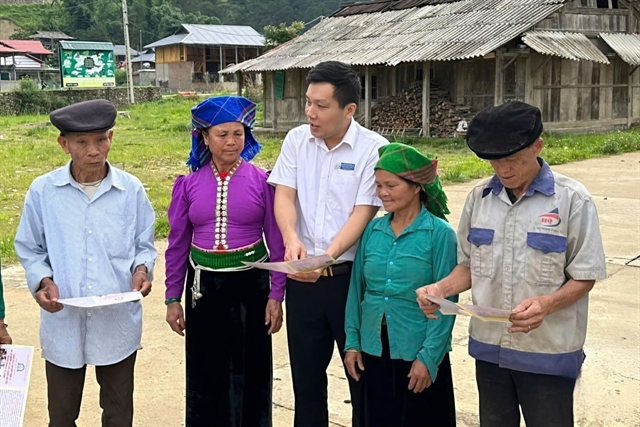 Society
Society

 |
| A legal aid officer from Sơn La's Legal Aid Centre talks to local elderly residents about their legal rights. — Photo baosonla.vn |
SƠN LA — Across Việt Nam, legal aid officers are quietly bridging the gap between the law and everyday life – helping those who can’t afford lawyers to resolve disputes, seek justice and rebuild trust in the system.
In the northern province of Sơn La, free legal aid has made a tangible difference for many elderly residents who often find legal procedures difficult to navigate.
One of them is S.A.C., a farmer from Tạ Khoa Commune. For years, he was locked in a bitter dispute with his neighbour over a small plot of farmland and a ten-million-đồng debt (US$380).
The disagreement dragged on for more than two decades, souring relations in the village.
When he finally turned to the provincial Legal Aid Centre, officers travelled to his home, reviewed the land papers, inspected the site and measured the boundaries.
Instead of pushing for a lawsuit, they encouraged both sides to sit down and talk. After several rounds of mediation – and plenty of explanation about what the law actually said – the two neighbours agreed to settle the issue peacefully.
"I thought it would have to go to court, and I’d lose both my land and my neighbours," the farmer said.
"But the officers came, explained things clearly and helped us find a fair solution. Now the land is settled, the debt’s gone and we didn’t have to spend a penny."
Sơn La, a mountainous province, is home to about 120,000 elderly residents – roughly one in ten people. Many live in remote communities with little access to legal advice.
The provincial legal aid centre has been stepping in to change that. Working with local authorities and mass organisations, it runs community workshops, distributes leaflets and offers free counselling and representation for those in need.
"Our goal is simple," said the centre’s director, Tòng Văn Minh.
"We want elderly people, especially those facing financial hardship or domestic violence, to know they can get help. By 2025, we aim for 80 per cent of those in need to access legal aid, and by 2030, at least 90 per cent."
Since 2022, the centre has organised 18 outreach sessions reaching around 5,000 people, distributed 25,000 legal information leaflets and handled more than 70 cases involving older citizens.
Most of these have been settled through consultation or mediation, without going to court.
Legal aid isn’t just for the elderly. In the southern province of Khánh Hòa, six teenagers recently charged with robbery were defended free of charge by the local legal aid centre after a motorbike sale turned violent.
 |
| A legal aid officer in Khánh Hòa provides legal advice to juveniles. — Photo tgpl.moj.gov.vn |
All came from poor families; five were under 18. Their lawyers argued that the boys had acted out of immaturity and confusion, not criminal intent and asked the court to apply provisions in the Penal Code allowing leniency for minors.
The judges agreed, sentencing the group to between two years and four months and six years in prison, below the minimum penalty requested by prosecutors.
For the legal aid officers, it was a reminder that the justice system can correct, not just condemn. "Our job is to make sure the law protects, not crushes," one said after the verdict.
Legal aid services, funded by the State but delivered at the local level, are now seen as a cornerstone of Việt Nam’s efforts to make justice accessible to everyone, from elderly farmers to struggling families and young offenders.
Officials say the work reduces social tension, cuts the number of cases going to court and helps people resolve disputes before they escalate.
"Legal aid brings the law out of offices and into people’s lives," Minh said.
"When citizens understand their rights, they can defend them; and that’s the foundation of justice." — VNS




